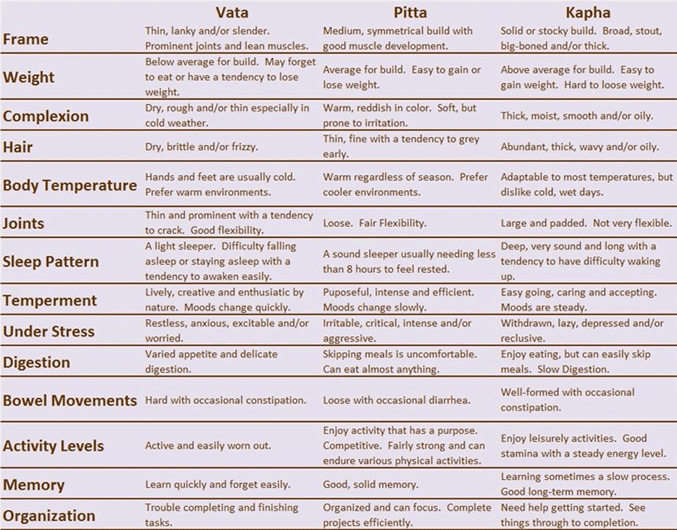 Loading... Please wait...
Loading... Please wait...Test Your Dosha
The following table characterizes 14 personal attributes by the three Ayurveic doshas. Every person has all 3 energies and will experience each dosha to a lesser or greater degree. Count how many of the attributes of each dosha best describe you to identify your dominate dosha.

Vata
Vata is the dynamic "kinetic" principle necessary to mobilize the function of everything great and small, but in the human body it governs over the nervous system. Air represents this dosha.
A Vata's frame is usually thin and slight in weight which means they have low energy reserves. Because they tire rapidly and get themselves out of balance so easily, it is important to get sufficient rest, keep a regular routine, and not overdo things. They have thin skin which is dry and rough with a tendency for prominent veins and cold to the touch. It is difficult for a Vata to stay warm. The cold winter months are the time when Vata is more likely to become out of balance and result in a cold or flu. Vata colds generally include a dry cough and hoarseness.
Vata usually have coarse, dry hair. Both their head and eyes will be small, quick, and unsteady. The Vata dosha controls all movement in the body, including breathing, digestion, and nerve impulses from the brain. They are extremely creative, artistic, with extreme moods of joyfulness and fear, accomplishment and insecurity, and are often anxious. When Vata is out of balance, anxiety and other nervous disorders may be present, as well as digestive problems, constipation, and cramps. Meditation and yoga are the best things to help alleviate stress. Vatas have variable and scanty appetites. They will be thin as children and have trouble gaining weight. Vatas like sweet, salty, and sour foods. They find oily foods comforting and benefit from ghee, a form of clarified butter. Vatas should choose warm foods with moderately heavy textures that are easy to digest, and enjoy hot drinks to keep them warm. Sweet berries, fruits, small beans, rice, all nuts, and dairy products are good choices for Vata types. Their bowels are usually hard and dry, and they are prone to constipation. Vatas are erratic and always unpredictable. They are light sleepers, restless, and it may be hard to quiet down at night. A Vata should keep a regular bedtime and morning routine. The hours before bed should be spent with quiet, relaxing activity. A moisturizing warm bath or shower is also very comforting and will aid in achieving a calmer slumber.
Pitta
Pitta is the thermal principle with the explosive force behind the ability to transform everything, but in the human body, it governs direct digestion and metabolism. Sun represents this dosha and fire is a main characteristic.
A Pitta stands with a medium frame, height, bone structure, and is well proportioned; their body temperature generally runs warm. They are the warriors of the doshas. Pitta types can go out of balance with overexposure to the sun and their eyes are sensitive to light (can cause dry or burning eyes); so it is important for them to keep cool by avoiding overexposure to direct sunlight, fried and spicy foods, alcohol and tobacco, overworking, and overheating. Toxic emotions such as jealousy, intolerance, control, and anger also should be avoided to keep Pitta in balance. Sharp minds, good concentration, orderly, focused, assertive, and entrepreneurial are Pitta at their best. Pittas have strong appetites and need large meals to be satisfied. They get irritated if they have to miss or wait for a meal. They like sweet, bitter, and astringent foods, and should choose fresh vegetables and fruits that are watery and sweet, especially cherries, mangoes, cucumbers, watermelon, avocado, and lots of salads with dark greens such as arugula, dandelions, and kale. Pittas like cold drinks and are known for their strong, intense digestion, but should be careful not to abuse it. Pittas sleep is short and deep, with fiery dreams of war and violence. They need to take some time between work and sleep to wind down the heat and relax. A cooler bath with a creamy soap will soothe Pitta toward a restful night's sleep..
Kapha
Kapha is the liquid principle and is the cohesion that holds everything together with electromagnetic and gravitational forces, and in the body it governs the moist tissues. Earth and water are the main characteristics.
Kapha tend to have sturdy, heavy frames, providing a good reserve of physical strength and stamina. This strength gives Kaphas a natural resistance to disease and a positive outlook about life. They are calm and affectionate but, when out of balance, can become stubborn and lazy. Cold and wet weather aggravates Kapha, and an imbalance may show up as a cold, allergies, or asthma. They should not dwell in the past or resist change. They tend to be overweight, eat slowly, and may also suffer from sluggish digestion. It is important Kaphas be active on a daily basis and get lots of exercise; they need to be careful not to overeat. Kaphas like dry, crispy foods and rarely drink. Tea with dried ginger and lemon is a great pick-me-up for Kaphas. They should avoid heavy oily and processed sugars, which are detrimental to Kaphas. They should choose foods that are light, warm, and spicy. They should use lots of spices such as black pepper, ginger, cumin, chili, and lots of bitter dark greens. Meditation is the best thing to alleviate stress. Kaphas love and need deep sleep or they'll be groggy, have a hard time waking up in the morning, and be ineffective, but they don't necessarily need a lot of sleep.
